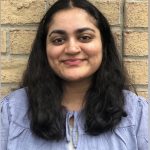 Welcome to the newest member of the ILead team, Shailee Koranne! Shailee will co-lead a new curriculum development initiative which aims to internationalize our leadership programming. In this interview, she talks about the past experiences that inform her work with international students and her thoughts on the importance of centering multicultural approaches to leadership.
Welcome to the newest member of the ILead team, Shailee Koranne! Shailee will co-lead a new curriculum development initiative which aims to internationalize our leadership programming. In this interview, she talks about the past experiences that inform her work with international students and her thoughts on the importance of centering multicultural approaches to leadership.
“…our students are part of a world, and are soon to be part of a workforce, that has people from all backgrounds. They may have different stories from the person next to them. We would be remiss if we weren’t giving students the chance to meaningfully prepare.”
Tell us a bit about your experience before you came to ILead, and what you’re bringing to the team here?
Before coming to ILead, I completed an undergraduate degree in Equity Studies with a focus on Disability Studies. After my undergrad I pursued a Master of Communications at Ryerson University. While I was there I took on student service roles where I worked with my peers and other equity-deserving students. One of my roles was with the Tri-Mentoring program. The program started 20 years ago when the school realized that equity-deserving students weren’t staying at the university.
What excited me about my previous work was that we could talk openly and honestly about our experiences as equity-deserving students. I’m interested in talking about social issues and creating space for people who don’t typically have a lot of space created for them.
Tell us about the project you’re co-leading at ILead?
ILead is internationalizing the Leadership Lab curriculum to recognize the diversity of students who attend U of T Engineering. A big goal is to revisit the curriculum to make sure that it’s speaking to a wide variety of leadership styles and types of leaders around the world. It’s about increasing cultural fluency, taking western leadership out of the center, and supporting students as they learn that leadership practices which look different in different contexts are equally valid.
Can you talk a bit about the relationships between international and domestic students?
That’s another overall goal of the project — to increase relationships between international and domestic students. And create a space where people can talk about leadership through a global lens.
Sometimes connection doesn’t happen because people don’t know what they have in common with another person. And that’s on both sides for different reasons. I do know what it’s like to come here from a different country, and go into schools feeling that everything is different and everyone is different from you. It’s really hard to not naturally drift to the people that make you feel safe. Especially with a language barrier.
When you have an opportunity to realize that you share experiences, like changing from high school to university, you complete a course together, or you work as student leaders together, that’s where connection happens.
Can you talk about why a project that internationalizes leadership education matters?
More and more people need to be able to work with others that don’t look like them. And that sounds very basic, but our students are part of a world, and are soon to be part of a workforce, that has people from all backgrounds. They may have different stories from the person next to them. We would be remiss if we weren’t giving students the chance to meaningfully prepare.
It’s also important to teach ideas of leadership that don’t make people feel that their cultural background is lesser-than. We need to do this so that people know that things they might think they have to change about themselves are actually powerful attributes.
I want to ensure that people know they don’t have to push themselves in ways that make them uncomfortable based on socially ascribed ideas about their identity.
